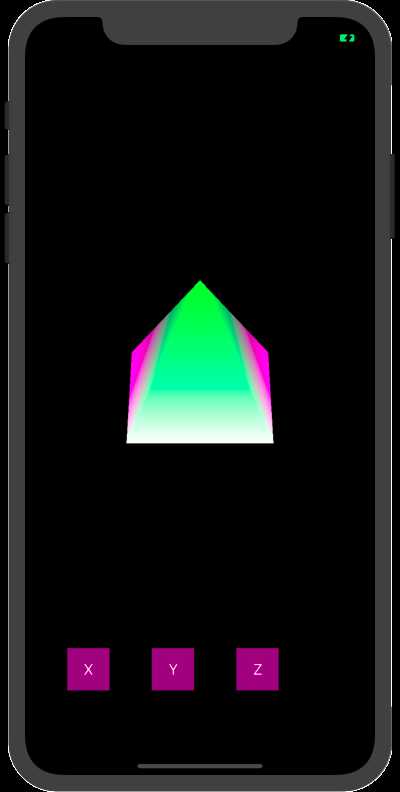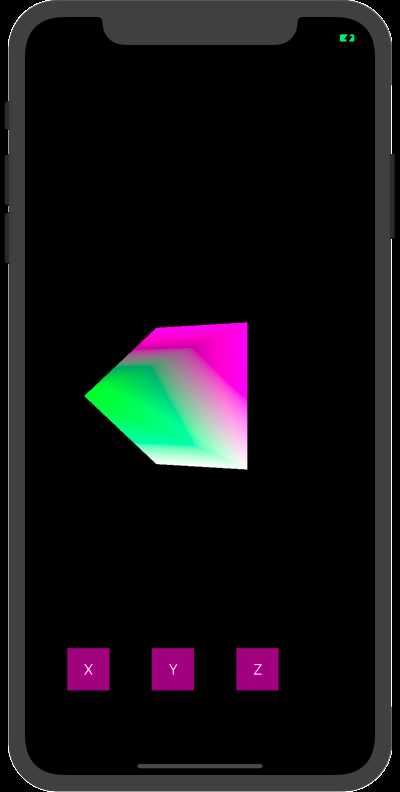OpenGL ES 渲染立体图形
Posted lybskill
tags:
篇首语:本文由小常识网(cha138.com)小编为大家整理,主要介绍了OpenGL ES 渲染立体图形相关的知识,希望对你有一定的参考价值。
一、理解
顶点数据存储在申请的缓冲区中,其由数据总线传递给着色器(如果是片元着色器,还须将顶点转换成片元),再由着色器最终渲染到涂层上;
二、思路
1.设置涂层;
2.创建上下文;
3.清空缓存区;
4.创建渲染缓存区和帧缓存区;
5.开始绘制;
三、核心代码
//最终渲染
- (void)renderLayer { //设置窗口背景颜色 glClearColor(0.0, 0.0, 0.0, 1.0); //清空颜色缓存 glClear(GL_COLOR_BUFFER_BIT); //设置视口大小 CGFloat scale = [[UIScreen mainScreen] scale]; glViewport(self.frame.origin.x*scale, self.frame.origin.y*scale, self.frame.size.width*scale, self.frame.size.height*scale); //读取顶点和片元着色器程序 NSString *vertFile = [[NSBundle mainBundle] pathForResource:@"shaderv" ofType:@"glsl"]; NSString *fragFile = [[NSBundle mainBundle] pathForResource:@"shaderf" ofType:@"glsl"]; NSLog(@"vertFile:%@", vertFile); NSLog(@"fragFile:%@", fragFile); //判断myProgram是否存在,存在则清空 if (self.myProgram) { glDeleteProgram(self.myProgram); self.myProgram = 0; } //加载着色器到myProgram中 self.myProgram = [self loadShader:vertFile frag:fragFile]; //创建链接 glLinkProgram(self.myProgram); GLint linkSuccess; //获取链接状态 glGetProgramiv(self.myProgram, GL_LINK_STATUS, &linkSuccess); //判断链接是否成功 if (linkSuccess == GL_FALSE) { //获取失败信息 GLchar message[256]; glGetProgramInfoLog(self.myProgram, sizeof(message), 0, &message[0]); //c字符串转换成oc字符串 NSString *messageString = [NSString stringWithUTF8String:message]; NSLog(@"error:%@", messageString); return; } else { //使用myProgram glUseProgram(self.myProgram); } //创建绘制索引数组 GLuint indices[] = { 0, 3, 2, 0, 1, 3, 0, 2, 4, 0, 4, 1, 2, 3, 4, 1, 4, 3 }; //判断顶点缓存区是否为空,为空则申请一个缓存区标志符 if (self.myVertices == 0) { glGenBuffers(1, &_myVertices); } //----------处理顶点坐标--------- /*顶点数据 1.前3个坐标值(x、y、z),后3个颜色值(RGB); 2.有先后顺序,否则绘制形状完全不同 */ GLfloat attrArr[] = { -0.5f, 0.5f, 0.0f, 1.0f, 0.0f, 1.0f, //左上 0.5f, 0.5f, 0.0f, 1.0f, 0.0f, 1.0f, //右上 -0.5f, -0.5f, 0.0f, 1.0f, 1.0f, 1.0f, //左下 0.5f, -0.5f, 0.0f, 1.0f, 1.0f, 1.0f, //右下 0.0f, 0.0f, 1.0f, 0.0f, 1.0f, 0.0f, //顶点 }; //将_myVertices绑定到GL_ARRAY_BUFFER标志符上 glBindBuffer(GL_ARRAY_BUFFER, _myVertices); //把顶点坐标数据从CPU复制到GPU上 glBufferData(GL_ARRAY_BUFFER, sizeof(attrArr), attrArr, GL_DYNAMIC_DRAW); //将顶点坐标数据通过myProgram传递到顶点着色器程序的position //获取顶点属性入口 GLuint position = glGetAttribLocation(self.myProgram, "position"); /*传递数据 1.一行6个数据,前3个为坐标,后3个为颜色; 2.NULL开始位置:默认为0,指向数组首地址; */ glVertexAttribPointer(position, 3, GL_FLOAT, GL_FALSE, sizeof(GLfloat)*6, NULL); //设置合适的格式从缓存区中读取数据 glEnableVertexAttribArray(position); //处理顶点颜色数据:传递到顶点着色器的positionColor GLuint positionColor = glGetAttribLocation(self.myProgram, "positionColor"); glVertexAttribPointer(positionColor, 3, GL_FLOAT, GL_FALSE, sizeof(GLfloat)*6, (float *)NULL +3); glEnableVertexAttribArray(positionColor); //在myProgram中找到透视投影矩阵和模型视图矩阵 GLuint projectionMatrixSlot = glGetUniformLocation(self.myProgram, "projectionMatrix"); GLuint modelViewMatrixSlot = glGetUniformLocation(self.myProgram, "modelViewMatrix"); //创建透视投影矩阵并初始化 float width = self.frame.size.width; float height = self.frame.size.height; KSMatrix4 _projectionMatrix; ksMatrixLoadIdentity(&_projectionMatrix); float aspect = width/height; ksPerspective(&_projectionMatrix, 30.0, aspect, 5.0f, 20.0f); //设置glsl里面的投影矩阵 glUniformMatrix4fv(projectionMatrixSlot, 1, GL_FALSE, (GLfloat *)&_projectionMatrix.m[0][0]); //开启剔除功能 glEnable(GL_CULL_FACE); //创建平移矩阵:Z轴平移-10 KSMatrix4 _modelViewMatrix; ksMatrixLoadIdentity(&_modelViewMatrix); ksTranslate(&_modelViewMatrix, 0.0, 0.0, -10.0); //创建旋转矩阵 KSMatrix4 _rotationMatrix; ksMatrixLoadIdentity(&_rotationMatrix); ksRotate(&_rotationMatrix, xDegree, 1.0, 0.0, 0.0); ksRotate(&_rotationMatrix, yDegree, 0.0, 1.0, 0.0); ksRotate(&_rotationMatrix, zDegree, 0.0, 0.0, 1.0); //将平移矩阵和旋转矩阵相乘,结果放到模型视图矩阵中 ksMatrixMultiply(&_modelViewMatrix, &_rotationMatrix, &_modelViewMatrix); //设置glsl里面的模型视图矩阵 glUniformMatrix4fv(modelViewMatrixSlot, 1, GL_FALSE, (GLfloat *)&_modelViewMatrix.m[0][0]); //设置绘制参数:片元、个数、索引数组 glDrawElements(GL_TRIANGLES, sizeof(indices)/sizeof(indices[0]), GL_UNSIGNED_INT, indices); //由顶点着色器将缓存区中的数据渲染到显示涂层上 [self.myContext presentRenderbuffer:GL_RENDERBUFFER]; }
四、效果


以上是关于OpenGL ES 渲染立体图形的主要内容,如果未能解决你的问题,请参考以下文章